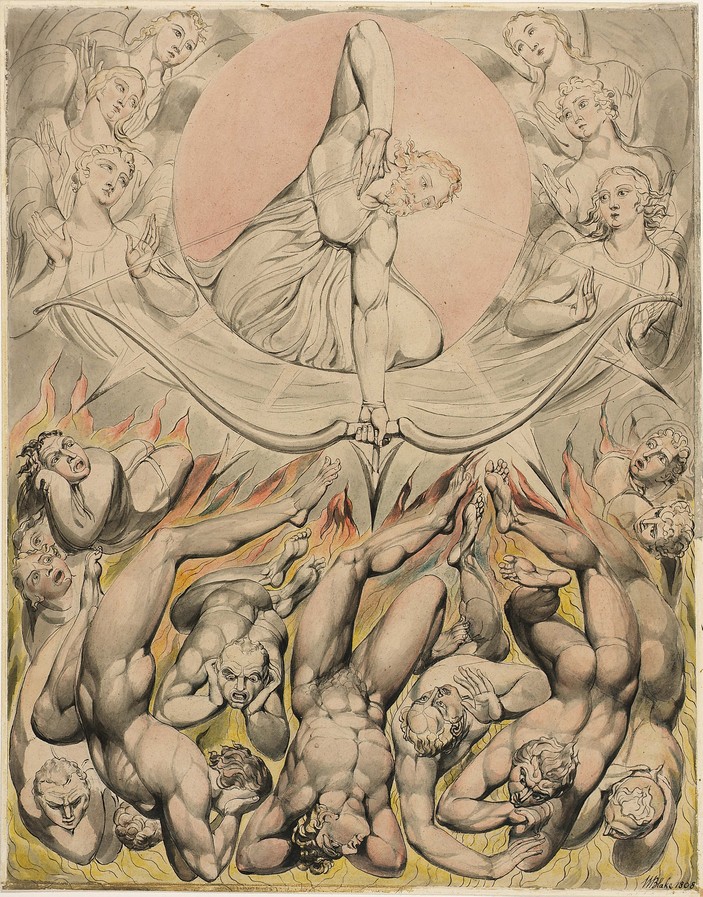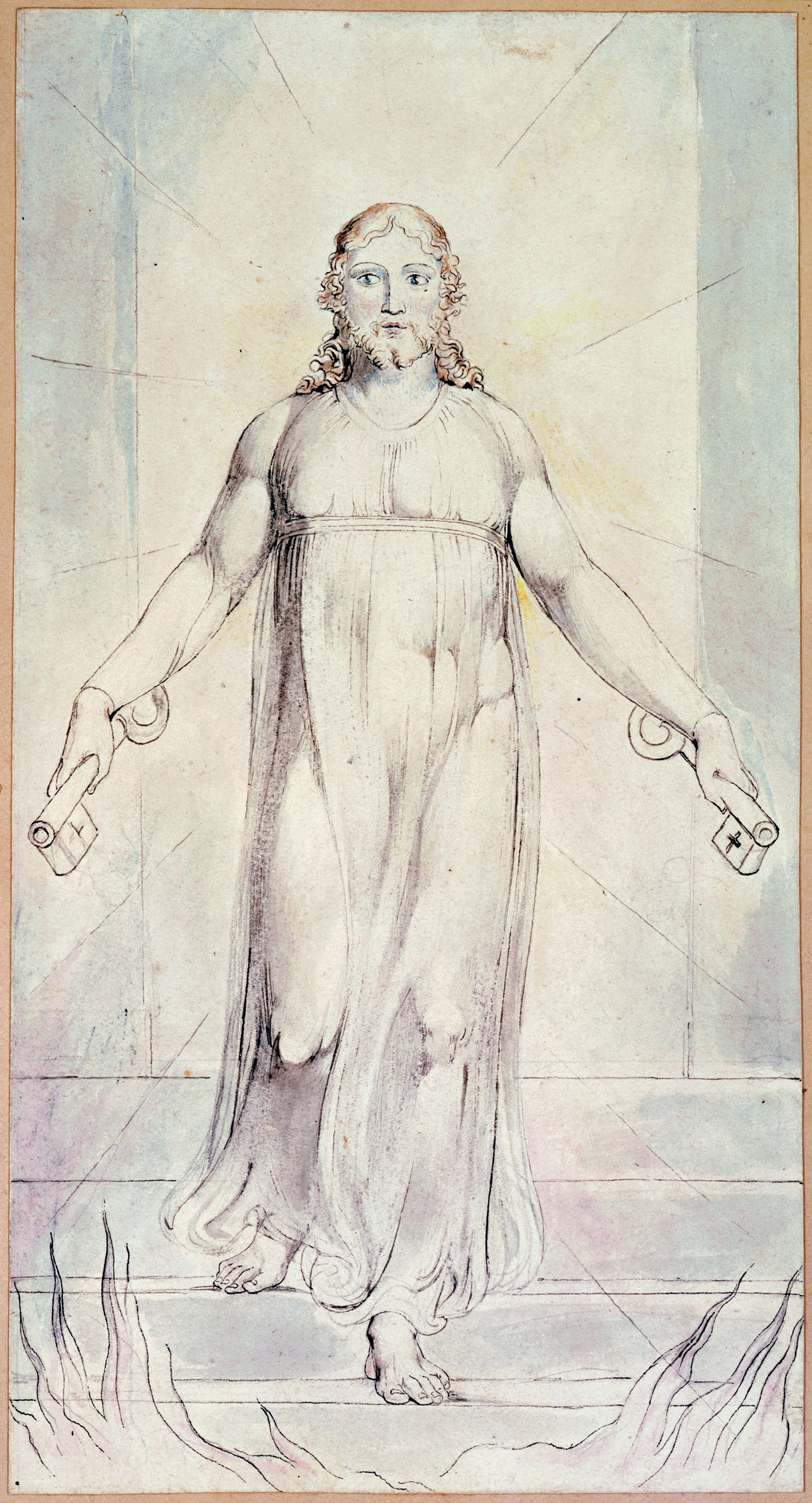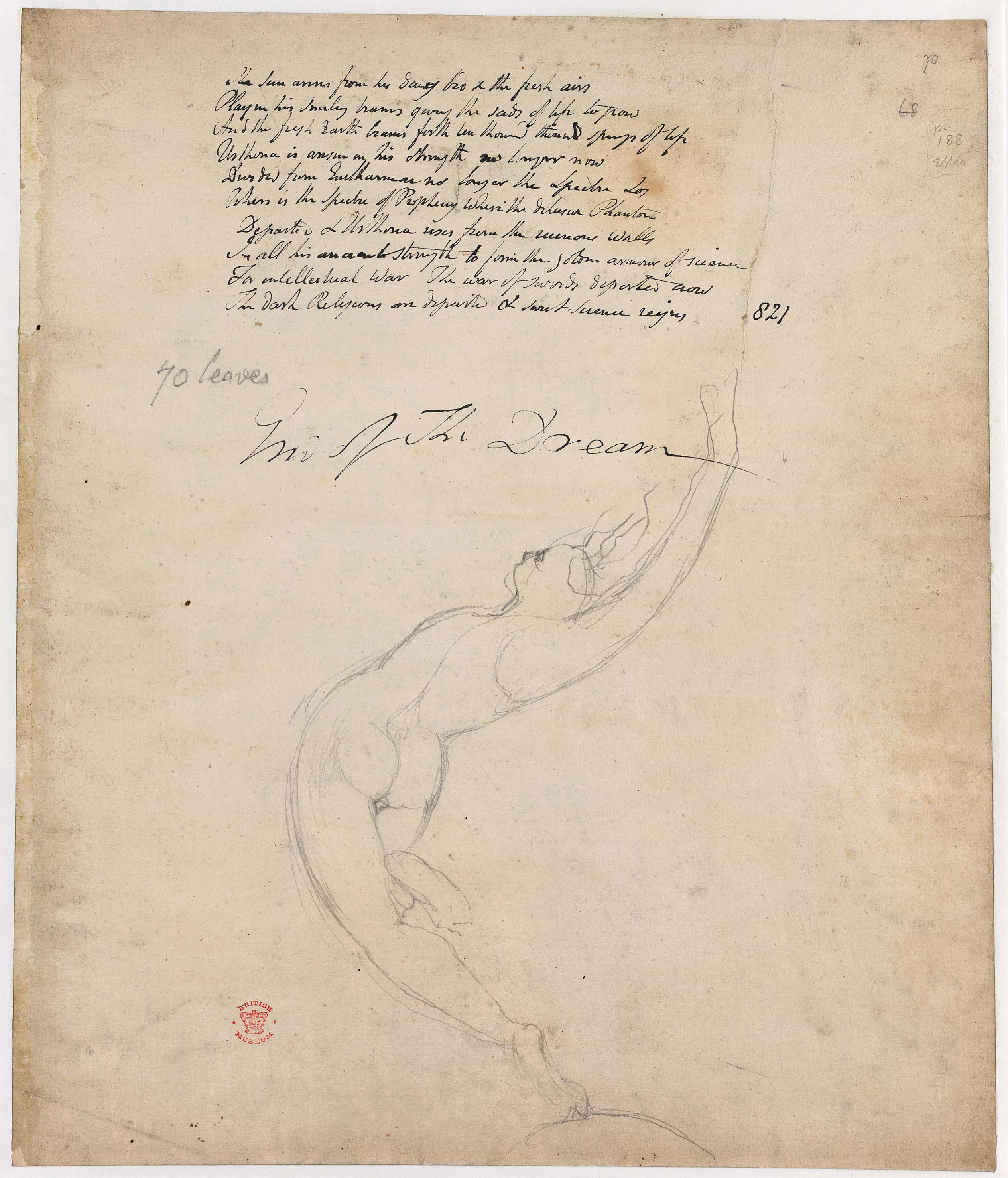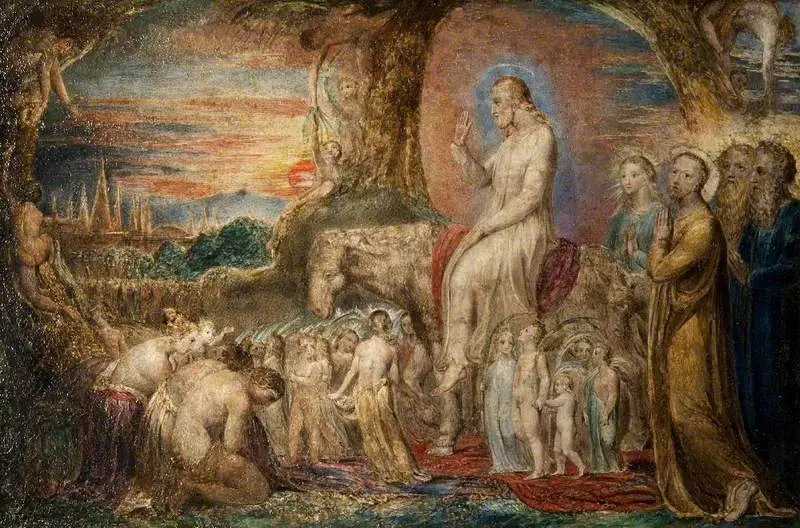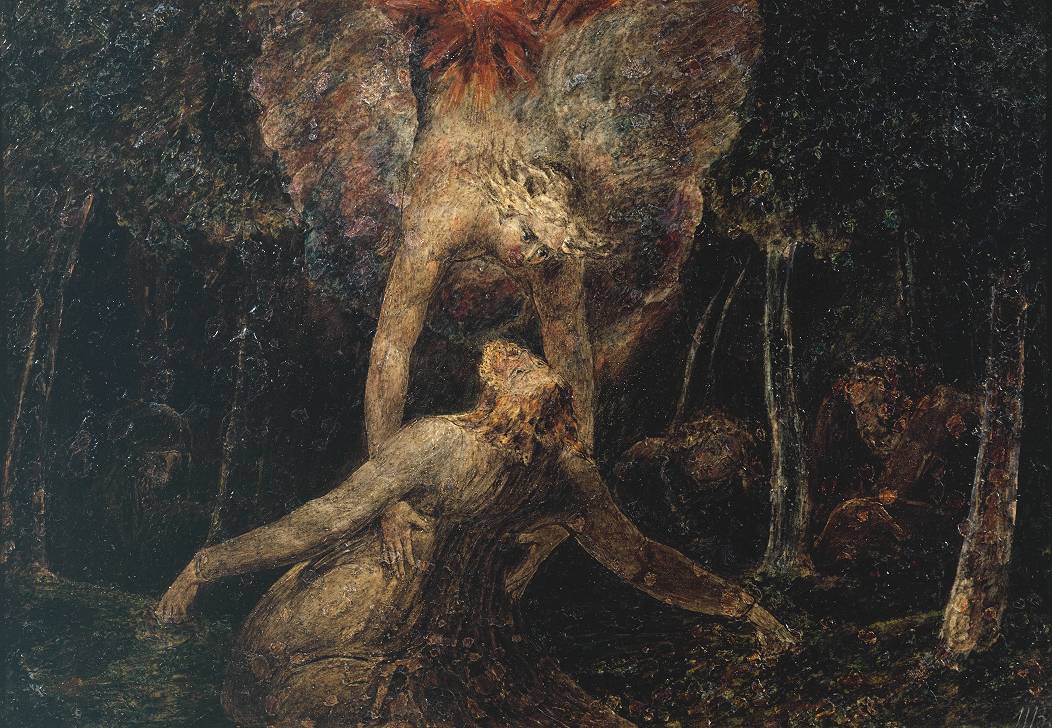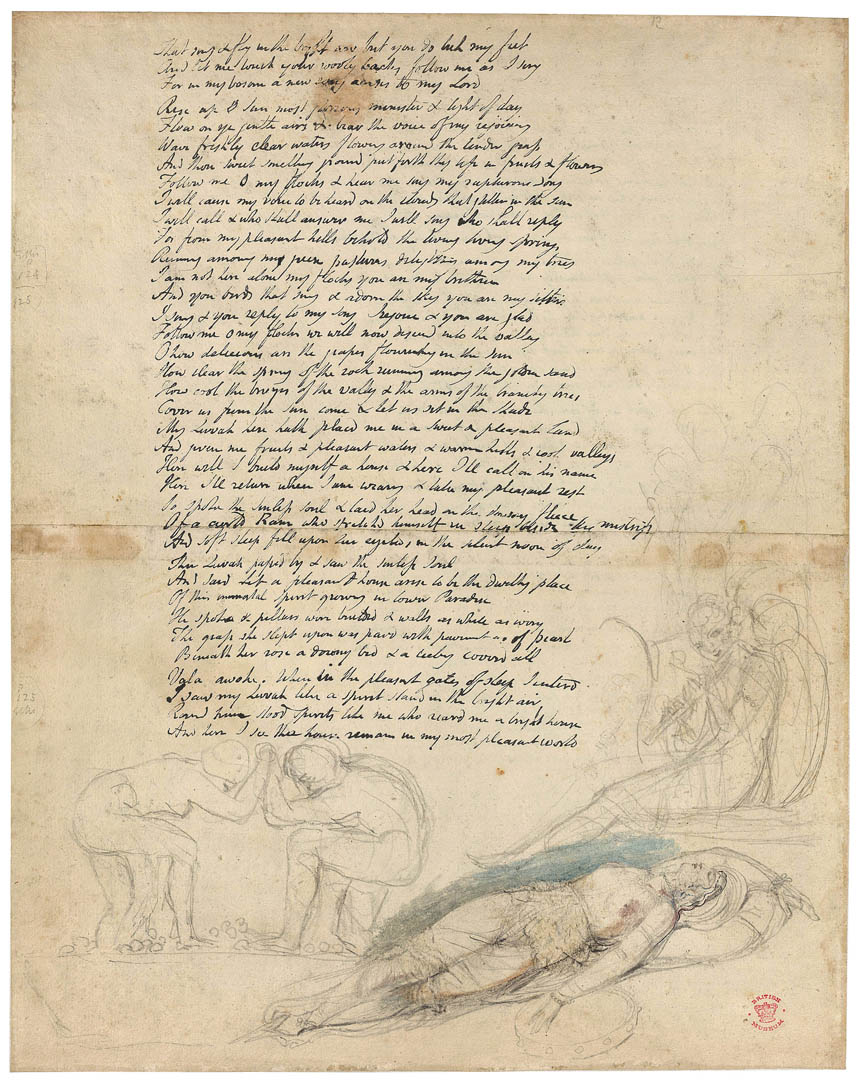 |
| British Museum Illustrations to Young's Night Thoughts |
Previously posted April 2019
This is an extract from Chapter Five (GOD) of Ram Horn'd With Gold by Larry Clayton.
The Evangelist John quotes Jesus in his starkest statement of his identity: "I and my Father are One" John 10:30. And later he recorded Jesus' great prayer of intercession for us,
"That they all may be one, as thou Father, art in me, and I in thee, that they also may be one is us."
If any one verse in the Bible most clearly expresses Blake's fundamental faith, that's it. Look at Blake's first mention of Jesus in 4Z:
"Then those in Great Eternity met in the Council of God
...
As One Man all the Universal family; and that One Man
They call Jesus the Christ, and they in him and he in them
Live in Perfect harmony, in Eden the land of life."
(The Four Zoas [Nt 1], 21.1-6; E310)
In the total structure of his theological vision Blake has imaginatively answered thoroughly and completely the prayer of Jesus in the Garden of Gethsemane. According to his vision Jesus, the One, comprises the true nature of you and me when we are healed and whole. Once again nothing could be more biblical.
Long before his encounter with Jesus Blake's myth was thoroughly grounded in the Oneness of Man. Albion was One, the Universe. His division was the Fall, and his return to unity the ultimate good. Thus Blake describes Albion, the Universal Man at the very beginning of 4Z:
Four Zoas, Night I, Page 4, (E 310)
"Daughter of Beulah, Sing,
His fall into Division and his Resurrection to Unity:
His fall into the Generation of decay and death, and his
Regeneration by the Resurrection from the dead."
That was the shape of the original myth. After Felpham Jesus became the One and Albion became one of his members--and so did Blake. 'Jerusalem' begins with a plate headed by the stark phrase in Greek, "Jesus only", and Blake reports hearing these words from the Savior:
Jerusalem, Plate 4, (E 146)
"I am not a God afar off, I am a brother and friend;
Within your bosoms I reside, and you reside in me:
Lo! we are One, forgiving all Evil, Not seeking recompense.
Ye are my members...."
And near the end of 'Jerusalem':
Jerusalem, Plate 91, (E 251)
"He who would see the Divinity must see him in his Children,
One first, in friendship and love, then a Divine Family, and in midst
Jesus will appear....
But General Forms have their vitality in Particulars, and every
Particular is a Man, a Divine Member of the Divine Jesus."
Jesus claimed to be one with God and prayed that we might join him in the oneness. Blake's pilgrimage, with his successive visions of God, those he hated as well as those he loved, provides a fascinating example of how a man becomes one with God. To love the true God is to hate all false Gods.
The priest claims the historical Jesus as his exclusive possession and as the ultimate sanction of his particular form of religious tyranny. He uses the figure first to cow and then to exploit his credulous followers. In this way he denies the indwelling Spirit in himself as well as in his flock. Blake's Jesus, in contrast to the priests', exists not in history but in heaven, which is not a far off never, never land, but a psychic reality.
The never, never land is a materialistic illusion. The reality of Jesus is eternal rather than material; preoccupation with the material Blake saw clearly as a rejection or refusal of the eternal. In 4Z Jerusalem, the embodiment of the church, responds materialistically to the death of Jesus: "let us build a Sepulcher and worship Death in fear while yet we live." What a powerful commentary on the response of the Church to the Christ event!
As long as our minds are centered in that particular century, Christ is dead for us. Preoccupied with the corporeal, we fail to discern the (spiritual) body. A few pages later we read that "Jerusalem wept over the Sepulcher two thousand years". Blake means that we Christians have done this under the influence of the established Church, dominated by the materialistic spirit of the age. While Jerusalem weeps over the corporeal body, like Mary Magdalen at the empty tomb, Jesus in his spiritual body stands beside her waiting to be recognized, but this won't happen until we (Jerusalem) awaken from our obsession with the material:
"And Los and Enitharmon builded Jerusalem, weeping
Over the Sepulcher and over the Crucified body
Which, to their Phantom Eyes, appear'd still in the Sepulcher;
But Jesus stood beside them in the spirit...."
(FZ9-117.1-4; E386)
The Eternal Man, both First and Second Adam, had God (Spirit) for father and Earth (Clay, Matter) for mother. Blake's profound allegiance to this traditional symbolism led to what many have perceived as a savage attack on Jesus' mother. The attack was savage, but the object of Blake's savagery was not Mary herself but the veneration of Mary, which he could only see as a reversion to Nature Worship and the fertility cults. He understood the veneration of Mary as an alternative to the Living Christ, a direct rival in fact of true Christianity.
This background helps one to understand the psychic meaning of the "Visions of Elohim Jehovah" concerning Joseph and Mary found on Plate 61 of 'Jerusalem'. Too lengthy to quote here, it gives the clearest picture of Blake's feelings about the corporeal ancestry of Christ. A brief but cogent statement of the same thing appears in 'The Everlasting Gospel':
All his life Blake had an implacable hatred of law, which he equated with coercion or hindering of others; to him that was the only sin. Consequently Blake's Jesus was a thorough going antinomian. Perhaps his most extreme expression of this occurs in MHH, written before his conversion:
Marriage of Heaven & Hell, Plate 21, (E 43)
"If Jesus Christ is the greatest man, you ought to
love him in the greatest degree; now hear how he has
given his sanction to the law of the ten
commandments: did he not mock at the sabbath, and so
mock the sabbath's God? murder those who were
murder'd because of him? turn away the law from the
woman taken in adultery? steal the labor of others
to support him? bear false witness when he omitted
making a defence before Pilate? covet when he pray'd
for his disciples, and when he bid them shake off
the dust of their feet against such as refused to
lodge them? I tell you, no virtue can exist without
breaking these ten commandments. Jesus was all
virtue, and acted from impulse, not from rules."
That's the proud, tongue in cheek, announcement of a young man not yet marked by the suffering of life. As he matured, his language became more moderate, but his attitude remained substantially the same. Blake hates the law, and his Jesus forgives the lawbreaker. The letter kills, but the Spirit gives life.
Law is an expression of authority. Life presents to us two kinds of authority: spiritual authority or God and political authority, his worldly shadow. Blake consumed his early years in rebellion against the shadow. Then at age 43 he met God and was able to submit to and affirm the true authority.
Some means of coercion characterizes all forms of political authority; ecclesiastical authority is no exception. Blake temperamentally renounced all forms of political authority; he felt that they were satanic, based on coercion and fear and earthly power. Political authority is the authority of this world, and he had no use for it.
In contrast, spiritual authority as Blake experienced it, is the exercise of the purest form of love with an absence of any sort of constraint. The release from constraint by the active goodwill calls forth the Divine Image from the dark sepulcher or cave of corporeal life. Blake had uniquely experienced this spiritual authority as a child; he rediscovered it in the experience which he understood as Self-annihilation or Forgiveness.
Henceforth for him this was the basic and intimate character and quality of Jesus. This was the good news. In 'Milton' the old antinomian made his commitment to the law of self giving love, referring to it as the "Universal Dictate". A free Blakean translation of John 3.16 with a touch of Philippians 2 added might read: God so forgave the world that he annihilated his transcendent Deity and united himself through a corporeal sepulcher with sinful, materialistic man to lift us up to Eternity. Here is the ultimate of spiritual authority, and those who meet Jesus begin to exercise it in the way that he did.
Although Blake did not often use the conventional Christian symbolism of the cross, after his conversion he did believe from the depths that by dying for one another we live eternally:
"Jesus said: "Wouldest thou love one who never died
For thee, or ever die for one who had not died for thee?
And if God dieth not for Man and giveth not himself
Eternally for Man, Man could not exist; for Man is Love
As God is Love; every kindness to another is a little Death
In the Divine Image, nor can Man exist but by Brotherhood."
(Jerusalem, 96.23ff; E256)
Freedom from materialism and from the law are the philosophic and moral coloring which Blake gave to his portrait of Jesus the One. In this way he accommodated his new vision of God to his existing value structure.
It was the experience of forgiveness and self-annihilation, which are two sides of the same coin. No one forgives until he has found the grace to annihilate at least momentarily the law bound accusing spectre which is his Selfhood. And this is only possible as an act of the Imagination, which is eternal, which is Christ. Whenever you successfully annihilate your old self to the point of truly forgiving another, the eternal Christ is alive and at work in your soul. In fact it is he who does it. He is in you, and you are in him; that's eternal life.
Reduced to its barest essential that's what Jesus finally came to mean for Blake. The only unique thing about the man of Nazareth was that he taught forgiveness of one's enemies. In this sense he incarnated God. God is love, is forgiveness. "If Morality was Christianity, Socrates was the Saviour." Unlike Socrates Jesus was a man in whom God dwelt through his vision and his acts of forgiveness.
The significance of the resurrection lies in the coming to life of Forgiveness, Jesus, in you and me. In this way we defeat death.
Textual note for Everlasting Gospel, (E 875)
"There is not one Moral Virtue that Jesus Inculcated but Plato
and Cicero did Inculcate before him; what then did Christ
Inculcate? Forgiveness of Sins. This alone is the Gospel,
and this is the Life and Immortality brought to light by Jesus,
Even the Covenant of Jehovah, which is This: If you forgive
one another your Trespasses, so shall Jehovah forgive you,
That he himself may dwell among you; but if you Avenge, you
Murder the Divine Image, and he cannot dwell among you; because
you Murder him he arises again, and you deny that he is Arisen,
and are blind to Spirit."
Textual note for Everlasting Gospel, (E 875)
"If Moral Virtue was Christianity
Christs Pretensions were all Vanity
And Caiphas & Pilate Men
Praise Worthy & the Lions Den
And not the Sheepfold Allegories
Of God & Heaven & their Glories
The Moral Christian is the Cause
Of the Unbeliever & his Laws
Take Jesus & Jehovahs Name.
For what is Antichrist but those
Who against Sinners Heaven close
With Iron bars in Virtuous State
And Rhadamanthus at the Gate... It was when Jesus said to Me
Thy Sins are all forgiven thee
The Christian trumpets loud proclaim
Thro all the World in Jesus name
Mutual forgiveness of each Vice
And oped the Gates of Paradise
The Moral Virtues in Great fear
Formed the Cross & Nails & Spear
And the Accuser standing by
Cried out Crucify Crucify
Our Moral Virtues neer can be
Nor Warlike pomp & Majesty
For Moral Virtues all begin
In the Accusations of Sin
And all the Heroic Virtues End
In destroying the Sinners Friend" End of Chapter Five of Ram Horn'd With Gold. 
